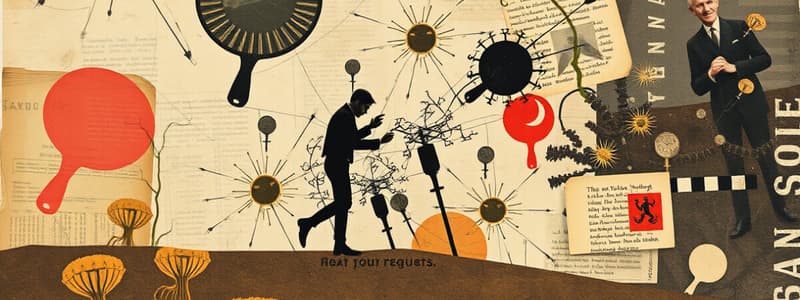Podcast
Questions and Answers
What does spontaneous generation propose?
What does spontaneous generation propose?
- Life is created directly through chemical processes.
- Living organisms arise from preexisting life.
- Life forms are a result of external influences.
- Living organisms arise from nonliving matter. (correct)
What did the sealed jars demonstrate in the context of biogenesis?
What did the sealed jars demonstrate in the context of biogenesis?
- Microbial growth is impossible in sealed environments.
- Microbial growth requires exposure to air. (correct)
- Living organisms can arise spontaneously.
- Sealing a container allows for spontaneous generation.
What was observed in the nutrient broth placed in a flask that was heated but not sealed?
What was observed in the nutrient broth placed in a flask that was heated but not sealed?
- Microbial growth occurred. (correct)
- The broth remained sterile.
- No microbial growth occurred.
- Maggots appeared in the broth.
What hypothesis supports that life forms arise from existing life?
What hypothesis supports that life forms arise from existing life?
In the experiment with the flask that was tipped, what was the result?
In the experiment with the flask that was tipped, what was the result?
What is the main concept demonstrated by Pasteur?
What is the main concept demonstrated by Pasteur?
What is pasteurization?
What is pasteurization?
Who proved that a bacterium causes anthrax?
Who proved that a bacterium causes anthrax?
What are Koch's postulates primarily used for?
What are Koch's postulates primarily used for?
What technique developed by Robert Koch is still used today?
What technique developed by Robert Koch is still used today?
Which of the following is NOT one of Koch's postulates?
Which of the following is NOT one of Koch's postulates?
What tool is commonly used in Koch's postulates to observe blood and tissue samples?
What tool is commonly used in Koch's postulates to observe blood and tissue samples?
What year was Robert Koch awarded the Nobel Prize for Physiology and Medicine?
What year was Robert Koch awarded the Nobel Prize for Physiology and Medicine?
What must be done to prove that a suspected pathogen causes disease?
What must be done to prove that a suspected pathogen causes disease?
What is the primary purpose of reisolating a suspected pathogen?
What is the primary purpose of reisolating a suspected pathogen?
Who proposed the use of immunology to identify bacteria by serotypes?
Who proposed the use of immunology to identify bacteria by serotypes?
What important discovery did Alexander Fleming make in 1928?
What important discovery did Alexander Fleming make in 1928?
In what decade did clinical testing and mass production of penicillin occur?
In what decade did clinical testing and mass production of penicillin occur?
Flashcards are hidden until you start studying
Study Notes
Anton van Leeuwenhoek and Microorganisms
- Leeuwenhoek (1673-1723) described live microorganisms for the first time, laying the groundwork for microbiology.
Debate over Spontaneous Generation
- Spontaneous Generation: Theory that living organisms arise from nonliving matter via a "vital force."
- Biogenesis: Theory that living organisms originate from preexisting life.
Experiments on Spontaneous Generation
- In experiments, sealed jars with fine netting showed no maggot growth, while open jars did, questioning the origins of maggots.
- Nutrient broth in a flask that was heated but not sealed resulted in microbial growth, whereas sealed broth showed no growth, raising the debate of spontaneous generation vs. biogenesis.
Pasteur's Contributions
- Louis Pasteur demonstrated spoilage bacteria could be killed by heating (pasteurization), a short exposure to high heat sufficient to kill pathogens without affecting the alcohol in wine.
Robert Koch and Infectious Disease
- Robert Koch (1843-1910) identified the bacterium causing anthrax and established Koch’s postulates, a systematic method to link specific microbes to specific diseases.
Koch's Postulates
- Postulate 1: The pathogen must be present in all cases of the disease and absent in healthy individuals.
- Postulate 2: The pathogen must be grown in pure culture from a diseased host.
- Postulate 3: Cultured pathogen must cause the disease when introduced to a healthy host.
- Postulate 4: The pathogen must be reisolated from the experimentally infected host and shown to be the same as the original.
Discovery of Antibiotics
- Alexander Fleming discovered penicillin in 1928, derived from the Penicillium fungus, which effectively killed Staphylococcus aureus.
- Clinical tests and mass production of penicillin began in the 1940s, marking the start of antibiotic therapy.
Immunology
- Immunology focuses on immunity and the study of vaccines and interferons as preventive measures against viral diseases.
- Rebecca Lancefield proposed the use of immunology to classify bacteria by serotypes in 1933.
Studying That Suits You
Use AI to generate personalized quizzes and flashcards to suit your learning preferences.



